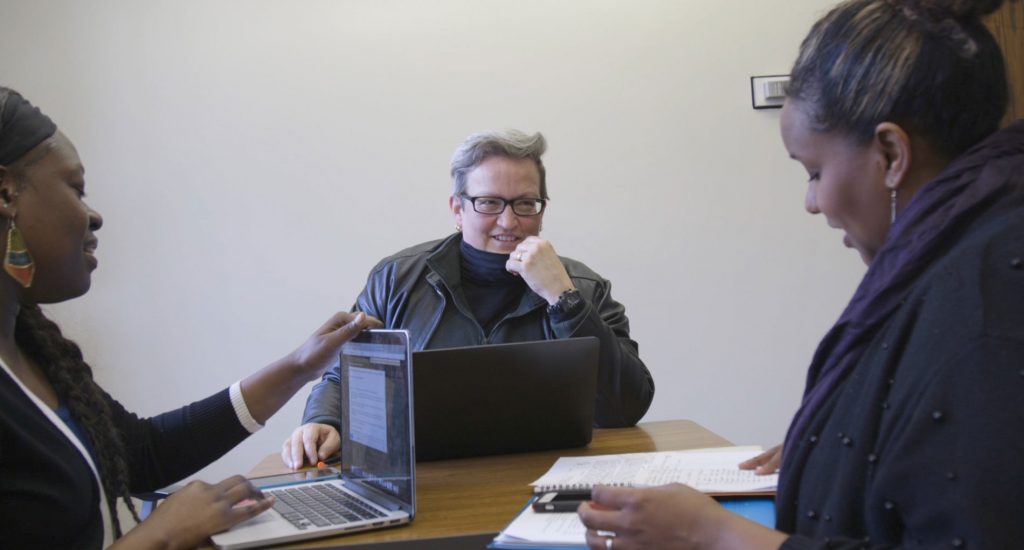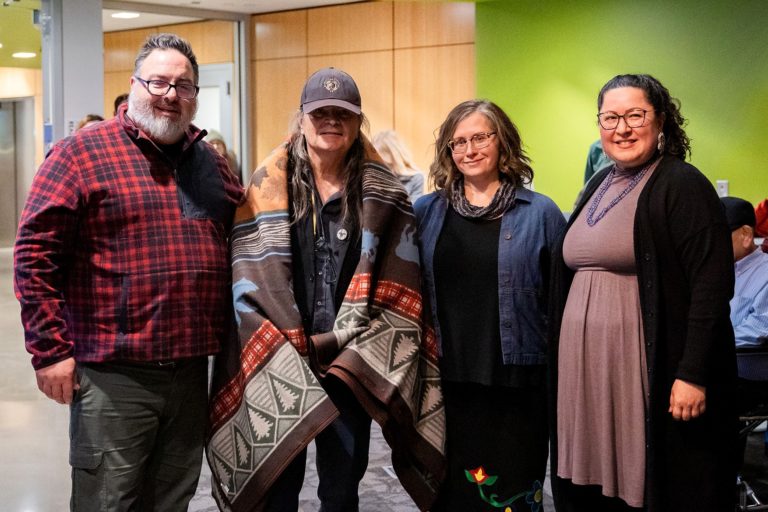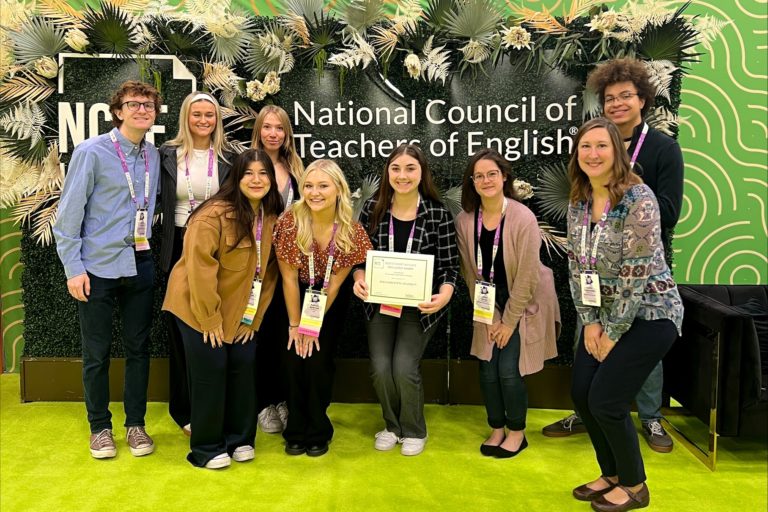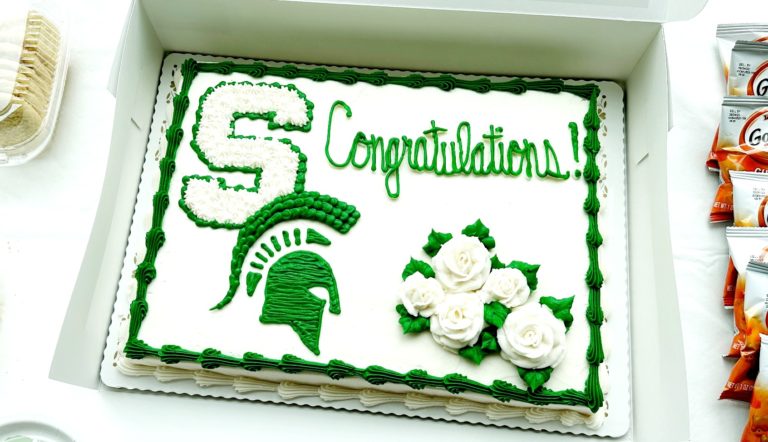
Using language purposefully is the framework of rhetoric, a notion that Jacqueline Rhodes, Professor and Interim Chair of the Department of Writing, Rhetoric, and American Cultures (WRAC), wants to instill in her students while also inspiring them to make meaning through the use of language.
“Starting from a foundation of goodwill lets you disagree about things and still engage in productive discussion. Part of that requires a rhetorical flexibility, and that is what I try to teach my students,” Rhodes said. “Sometimes, you need to make a point in this particular way to this particular audience for this particular purpose. Other times, you need to make the same point, but in a different context, so you need to know how to shift. People are already rhetorical by the time they get to the classroom, so a lot of it is just opening their eyes to how language shapes and contributes to how we see the world.”
Rhodes says she likes working with students who suddenly find an interest in something they did not think they would enjoy.
“It is those ‘aha’ moments where students learn they can actually change conversations,” she said. “That is at the heart of what rhetoric is supposed to do: to study conversations, whether scholarly or real-world, and intervene, shape, and change the world. Seeing that realization on the part of undergraduate and graduate students is really rewarding.
Researching the Role of Language in Building Alliances
Much of Rhodes’ research focuses on the late ’60s and the ‘70s as it relates to radical feminist culture and activists, specifically those in the feminist and LGBT communities.
“A large part of my research looks at activist work, and I try to look at how radically different groups work together, how they build alliances, and how they come to a consensus,” Rhodes said. “Too often what happens is people disagree, and they get polarized. They will not act, or everybody is waiting for everybody to agree 100% and, in the meantime, we are sacrificing the good for the perfect. The perfect is not coming, so how do you build alliances? I look at how people use language to build those alliances in radical groups.”
Rhodes currently is working on a documentary where she travels around the country to conduct in-person interviews with activists from the ‘70s.
“This documentary is about a separatist group in the early ‘70s that was forming coalitions with different radical groups, even though they disagreed about whether gender, race, or sexuality was the foundational difference,” Rhodes said. “They each had different opinions about what needed to be attacked first, but they had to build a coalition; they had to build an alliance to act. So, it gets back to the whole idea of the people behind the thing. What is interesting is not just the radical politics, but what happened to these people in their 20s that radicalized them, and it has been rewarding to move away from doing purely textual research to talking to the people who actually wrote those texts.”
Human beings love stories, and a lot of rhetoric is telling stories in ways to make sense. These stories let us see things in different ways, and that sort of texture is ineffable.
JACQUELINE RHODES, PROFESSOR AND INTERIM CHAIR OF WRAC
This represents a new direction for her research, but Rhodes says the purpose of the documentary is not to advance her career, but rather to give something to the activist community.
“I want to give this to them and say, ‘Here is your history. Here is our history. Let’s look at what we can do and what we can learn from this so that we can change things,’” she said. “I think people have forgotten their history, and very often, we are prone to dismissing activism because it did not go far enough, but I think there are things to learn from what they did.”
As a liberal arts scholar, Rhodes understands the value of storytelling.
“Human beings love stories, and a lot of rhetoric is telling stories in ways to make sense,” she said. “These stories let us see things in different ways, and that sort of texture is ineffable, almost somatic emotional texture, and I am not sure if disciplines like biology and mathematics get that. The College of Arts & Letters accesses a part of humanity that is not well described in science.”
A Passion for Teaching and the Land Grant Mission
Rhodes received her Ph.D. in English from the University of Southern Mississippi and her M.A. in English from the University of Idaho.
“I was going to be a fiction writer and an author, then I got to my master’s program and I got a teaching assistantship,” she said. “I started teaching first-year composition, and I loved it, and it turned out that I was good at it. If you can find something that you are good at and you love doing, you should probably do that.”

Rhodes’ attraction to the land grant initiative at MSU was a key factor in her decision to come here.
“I loved the land grant mission, and I keep remembering how great I thought it was,” Rhodes said. “Our College, with its emphasis on the Citizen Scholars program, the critical diversity initiatives, even working with the College of Agriculture on Food@MSU, all of those different initiatives point to actual engaged work in the world. There is no longer the sense of, or there should not be, the university as this ivory tower that we all cower inside of and do not matter, rather our mission from inception has been to create good, critical, informed citizens. That means creating the spaces for students to become those sorts of citizens, but also for the scholars, staff, and administration to do the same.”
Rhodes also chose to come to MSU because she wanted to focus more on her research.
“I was previously teaching at Cal State San Bernardino, a teaching-intensive university, because I really do love to teach, but I was not having a lot of time to do my research,” she said. “I was not only attracted to MSU being the first land grant university, but it also seemed like the place to be because I would have some support for my research and still be able to teach and make a difference in the world.”


